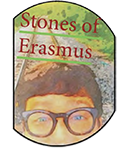$3
Tyche & Nemesis Greek and Roman Mythology Lesson Activity | ELA Humanities 8-10
Spin the Wheel of Fortune with Tyche and Nemesis — A Two-Day English Language Arts Lesson Your Students Won't Forget!
Invite your middle and high school students to explore the mythic figures Tyche (Fortuna) and Nemesis—anthropomorphic personifications of fortune, chance, order, and conscience. Whether you teach Edith Hamilton’s Mythology, Apollodorus’s Library of Greek Mythology, or a world-literature survey, this lesson pack turns abstract ideas into vivid classroom experiences through illustrated reading cards, inquiry-based prompts, and collaborative activities.
What's Inside:
- Formats: PDF ( 22 pages, Google Workspace™ (18 Slides)
- Two-Day Lesson Calendar: Step-by-step guidance with optional extension ideas
- Anchor Chart: Illustrated reference of key characters and concepts
- Map Activities (2): Locate major temples and contextualize the myths geographically
- Illustrated Reading Cards (6)
- “Tyche” (dictionary entry)
- Temple of Fortuna at Praeneste (Palestrina)
- Temple of Fortuna in Pompeii
- “Nemesis” (dictionary entry)
- Astraea & Nemesis
- Nemesis in the Origin Story of Helen of Troy
- Reading Protocols
- Nine public-domain images woven into close-reading tasks
- Question Bank (20): Use as a quiz or a discussion launch
- Frayer Model Template: Visual vocabulary builder for key terms
- Exit Tickets (2, half-sheet): Differentiated reflection prompts for quick formative data
- Note-Taking Sheets (2)
- Three-Box Cornell template
- Illustrated notes page
- Further Reading List
- Curated bibliography for projects or deeper dives
- Answer Keys & Samples: Model responses for every student-facing task
- 2-Point Writing Rubric: Quick, transparent feedback tool
Students will:
✓ Compare multiple versions of the Tyche and Nemesis myths, sharpening critical-thinking skills.
✓ Master key vocabulary in context, meeting Common Core RL and L standards.
✓ Collaborate to discuss how myths shape language, social custom, and beliefs.
✓ Write reflective and analytical pieces on the roles of chance and justice in human life.
✓ Connect ancient concepts to modern examples (e.g., why 'nemesis' did not originally mean 'arch-enemy' or how the symbols of Tyche are still used in modern phrases).
